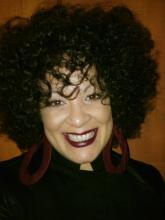In Winter 2017, the English Department’s Visiting Lecturers Committee (Alys Weinbaum, Gillian Harkins, and David Shields) hosted a panel and conversation about the challenges to teachers and teaching in the wake of the post-election rise in hate speech, white supremacy, and criminalization of immigrants and refugees. The panel, moderated by professor Alys Weinbaum, featured Carmen Kynard (John Jay College for Criminal Justice, CUNY) as a guest panelist, alongside faculty member Anu Taranath (English and CHID), and English graduate students Allen Baros, Alysse Hotz and Belle Kim.
The panel convened as a response to student concerns, as a response to teachers feeling inhibited from doing their work, and in recognition of a need to balance openness in the classroom with policy for coping with a surge in intolerant speech on campus. Panelists suggested strategies for managing classrooms and discussions, including how to inclusively teach all of our students and how to help our students be able to listen to each other longer in tense moments.
Carmen Kynard provided key-note advice to pass along to students whose voices historically and contemporarily might not be clearly heard or safely expressed in the college classroom. Kynard posited that learning is always about unanswered questions, not solely the materials that one learns, and we should invite students to join this exploration. Panelists counseled the assembled teachers to figure out their roles as academics and intellectuals, to resist being pushed into preset roles. As such we might model for our students a multiplicity of ways to exist as academics in colleges and departments that to students might appear as intellectually and discursively monolithic.
In concert with this event, English department leaders have crafted a statement of values that faculty and TAs can, if they choose, include in their syllabi and use as part of framing their courses and class discussions. The statement is only part of a larger effort we are engaged in as a department to support each other and the work we do, and to support respectful and critical consideration of all points of view in our classrooms. English Matters excerpts this statement below:
The UW English Department aims to help students become more incisive thinkers, effective communicators, and imaginative writers by acknowledging that language and its use is powerful and holds the potential to empower individuals and communities; to provide the means to engage in meaningful conversation and collaboration across differences and with those with whom we disagree; and to offer methods for exploring, understanding, problem solving, and responding to the many pressing collective issues we face in our world ....
As a department, we begin with the conviction that language and texts play crucial roles in the constitution of cultures and communities. Our disciplinary commitments to the study of language, literature, and culture require of us a willingness to engage openly and critically with questions of power and difference. As such, in our teaching, service, and scholarship we frequently initiate and encourage conversations about topics such as race, immigration, gender, sexuality, and class. These topics are fundamental to the inquiry we pursue. We are proud of this fact, and we are committed to creating an environment in which our faculty and students can do so confidently and securely, knowing that they have the backing of the department....
